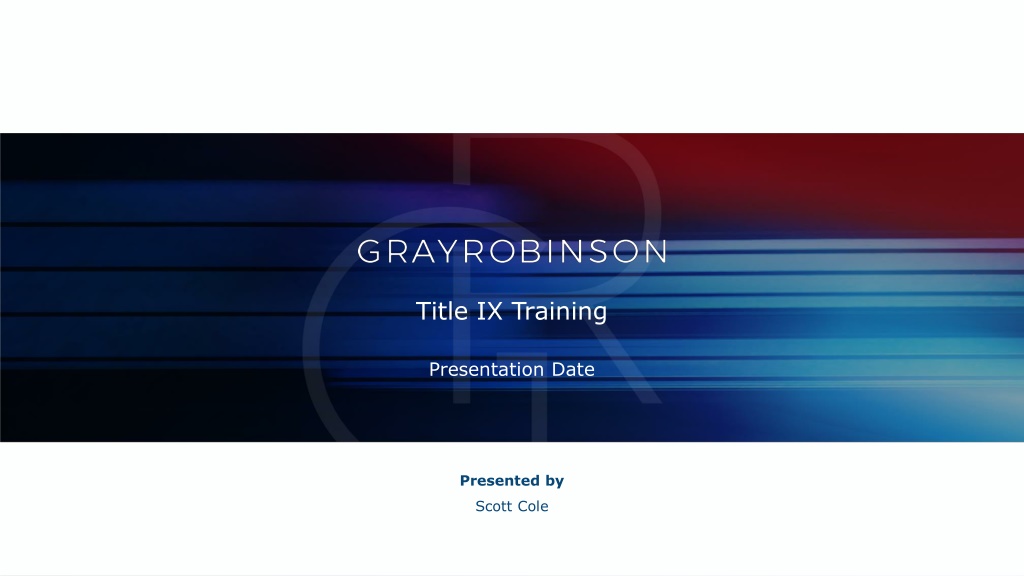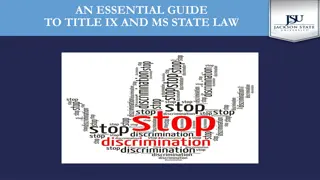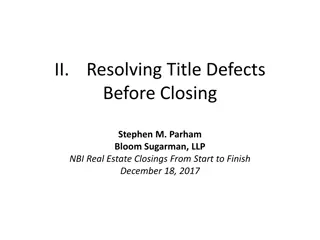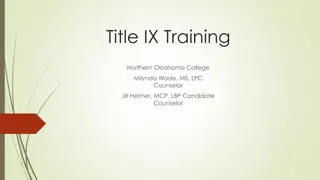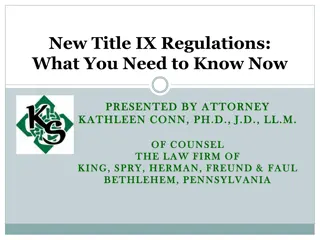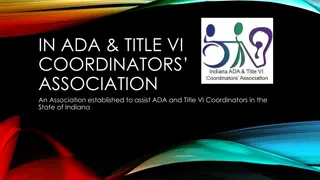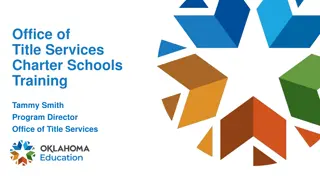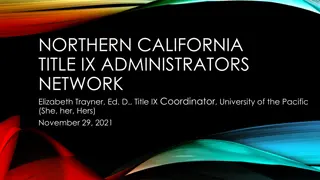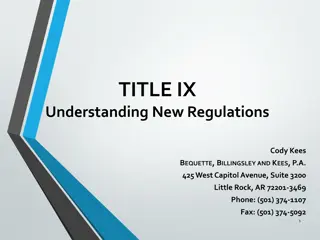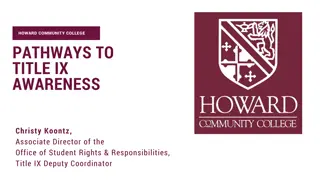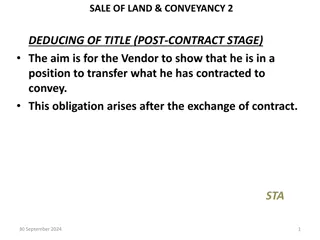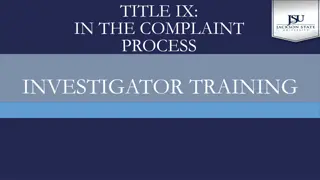Title IX Training
Title IX regulations mandate that educational institutions provide training to personnel involved in addressing sexual harassment and discrimination. This training covers defining sexual harassment, conducting investigations impartially, avoiding bias, and ensuring fair treatment in grievance processes. Participants in the Title IX process include the coordinator, investigator, decision-maker, and appellate officer, each serving specific roles to uphold Title IX policies.
Download Presentation

Please find below an Image/Link to download the presentation.
The content on the website is provided AS IS for your information and personal use only. It may not be sold, licensed, or shared on other websites without obtaining consent from the author.If you encounter any issues during the download, it is possible that the publisher has removed the file from their server.
You are allowed to download the files provided on this website for personal or commercial use, subject to the condition that they are used lawfully. All files are the property of their respective owners.
The content on the website is provided AS IS for your information and personal use only. It may not be sold, licensed, or shared on other websites without obtaining consent from the author.
E N D
Presentation Transcript
Title IX Training Presentation Date Presented by Scott Cole
Title IX Statute- 20 U.S.C. 1681 No person in the United States shall, on the basis of sex, -- be excluded from participation in, -- be denied the benefits of, or -- be subjected to discrimination under any education program or activity receiving Federal financial assistance. This means that a student s (or applicant s) status is not influenced by his or her gender, as well as providing equal access to sports and other school-sponsored activities.
The Final Regulations Published in the Federal Register on May 19, 2020 (34 CFR Part 106) Effective date: August 14, 2020 New Regulations expected in October Proposed Regulations at 87 FR 41390
Why Title IX Training? Title IX Regulations Require Training Schools must ensure that Title IX personnel, including the Title IX Coordinator, any investigator, decision-maker, and facilitators of an informal resolution (such as mediation)] receive training as follows: On Title IX sdefinition of sexual harassment On the scope of the school s education program or activity On how to conduct an investigation and grievance process On how to serve impartially, including by avoiding prejudgment of the facts at issue
Why Title IX Training? On how to avoid conflicts of interest and bias Decision-makers must receive training on any technology to be used at a live hearing, and on issues of relevance of questions and evidence, including when questions and evidence about a complainant s sexual predisposition or prior sexual behavior are not relevant Investigators must receive training on issues of relevance to create an investigative report that fairly summarizes relevant evidence
Who are the Participants in the Title IX Process? Title IX coordinator (Required to have one)- Manages the Title IX Process Title IX investigator- Conducts Title IX Investigations Title IX coordinator can serve as an investigator but cannot be a decision-maker or appellate officer Title IX decision-maker- Makes Determination of violations of Title IX Policies/Procedures-\Cannot be the investigator or Title IX coordinator Appellate officer- Hears appeals of Title IX Determination- Cannot be the original decision-maker or investigator Anyone implementing an informal process such a mediation, case management, records management, etc. Advisors- Not required to be trained but participate by assisting parties
Primary Types of Sex Discrimination We will focus on Sex Discrimination aspects of Title IX Discriminatory acts based on person s sex Sexual Harassment- most common form of sex discrimination at colleges We will focus on Sexual harassment as a form of sex discrimination
Summary of your Obligations If you have actual knowledge of sexual harassment that occurred in your education program or activity against a person in the United States, then you must respond promptly in a manner that is not deliberately indifferent. Acting with actual knowledge and with Deliberate Indifference exposes the college to liability for damages in court.
What is Actual Knowledge? Actual knowledge- Notice of sexual harassment or allegations of sexual harassment to a recipient s Title IX Coordinator or any official of the recipient who has authority to institute corrective measures on behalf of the recipient A school may, at its discretion, designate specific employees as officials with this authority. Imputation of knowledge based solely on vicarious liability or constructive notice is insufficient to constitute actual knowledge.
Actual Knowledge This standard is not met when the only official of the recipient with actual knowledge is the respondent. The mere ability or obligation to report sexual harassment or to inform a student about how to report sexual harassment, or having been trained to do so, does not qualify an individual as one who has authority to institute corrective measures on behalf of the recipient.
Summary of your Obligations If you have actual knowledge of sexual harassment that occurred in your education program or activity against a person in the United States, then you must respond promptly in a manner that is not deliberately indifferent. Acting with actual knowledge and with Deliberate Indifference exposes the college to liability for damages in court.
Definition of Sexual Harassment 1. Conduct on the basis of sex that satisfies one or more of the following an employee of the recipient conditioning the provision of an aid, benefit, or service of the recipient on an individual s participation in unwelcome sexual conduct; (Often called Quid Pro Quo) Ex: Faculty member offers Student an A for sexual favors (
Definition of Sexual Harassment 2. Unwelcome conduct that is severe, pervasive, and objectively offensive denies or limits a person s access to the program or activity; All three must be present Reasonable Person Standard Applies to severity, pervasiveness, and objective offensiveness- Evaluated both objectively and subjectively sexual harassment under Title IX does not include conduct that is protected by the First Amendment
Physical conduct is more likely to be severe if accompanied by threats or violence Conduct is likely to be pervasive if Widespread Openly practiced Well-known among students or employees Occurring in public spaces
Physical conduct is objectively offensive if: Reasonable person would find it offensive Consider Age and relationships of Complainant and Respondent Frequency Severity
3. Sexual assault, stalking, dating violence, domestic violence
Sexual Assault Sexual assault is any intentional sexual contact without consent, whether such contact directly touches skin or is through clothing. It includes any intentional sexual contact with the breasts, buttocks, groin, genitals, mouth, or other bodily orifice of another; or touching another with any of these body parts; or making another touch you or himself or herself with or on any of these body parts; or any intentional bodily contact of a sexual nature, whether or not it involves the previously mentioned body parts; or disrobing or exposure of another without that person s consent. Sexual assault also includes attempted nonconsensual sexual intercourse.
Stalking Stalking. (i) Engaging in a course of conduct directed at a specific person that would cause a reasonable person to (A) Fear for the person s safety or the safety of others; or (B) Suffer substantial emotional distress. (ii) For the purposes of this definition (A) stalker directly, indirectly, or through third parties, by any action, method, device, or means, follows, monitors, observes, surveils, threatens, or communicates to or about a person, or interferes with a person s property. Course of conduct means two or more acts, including, but not limited to, acts in which the (B) similar identities to the victim. Reasonable person means a reasonable person under similar circumstances and with (C) does not necessarily, require medical or otherprofessional treatment or counseling. 34 C.F.R 668.46(a) Substantial emotional distress means significant mental suffering or anguish that may, but
Dating Violence Dating violence. Violence committed by a person who is or has been in a social relationship of a romantic or intimate nature with the victim. (i) reporting party s statement and with consideration of the length of the relationship, the type of relationship, and the frequency of interaction between the persons involved in the relationship. The existence of such a relationship shall be determined based on the (ii) For the purposes of this definition (A) the threat of such abuse. Dating violence includes, but is not limited to, sexual or physical abuse or (B) domestic violence. Dating violence does not include acts covered under the definition of
Domestic Violence Domestic violence. (i) A felony or misdemeanor crime of violence committed (A) By a current or former spouse or intimate partner of the victim; (B) By a person with whom the victim shares a child in common; (C) a spouse or intimate partner; By a person who is cohabitating with, or has cohabitated with, the victim as (D) or family violence laws of the jurisdiction in which the crime of violence occurred, or By a person similarly situated to a spouse of the victim under the domestic (E) that person s acts under the domestic or family violence laws of the jurisdiction in which the crime of violence occurred. By any other person against an adult or youth victim who is protected from 34 C.F.R 668.46(a)
Consent Sexual Assault has not occurred if the sex activity was consented to by the Complainant. Consent means a voluntary, informed, and freely given agreement, through words and/or actions, to participate in mutually agreed-upon sexual acts. Consensual sexual activity happens when each partner willingly and affirmatively chooses to participate in each sexual act. A person who is incapacitated is not capable of giving consent Consent cannot be coerced Must be adult to provide consent .
What Constitutes Consent? No means no, but nothing also means no. Silence and passivity do not equal consent. To be valid, consent must be given immediately prior to or contemporaneously with the sexual or intimate activity Consent can be withdrawn at any time, so long as it is clearly communicated verbally or non-verbally .
What constitutes Incapacity? A Person can be incapacitated (incapable of consent) when they cannot appreciate the nature or existence of sexual activity due to the use of drugs or alcohol, a medical condition or disability, or factors. Incapacitation is a determination that will be made after the incident in light of all the facts Example: Female student passes out during a sex act, even if begun with apparent consent. .
Summary of your Obligations If you have actual knowledge of sexual harassment that occurred in your education program or activity against a person in the United States, then you must respond promptly in a manner that is not deliberately indifferent.
What is an Educational Program or Activity? Locations, events, or circumstances, whether on campus or off campus (but within the U.S) over which the institution exercised substantial control over both the respondent and the context in which the sexual harassment occurs. It also includes: any building owned or controlled by an officially recognized student org., e.g., fraternity or sorority houses 106.44(a)
What is an Educational Program or Activity? Jurisdiction will extend to off-campus sex discrimination where respondent is: Acting as an university representative Professor provides personal tutoring to a student at his private apartment and make a sexual advance. Off-campus conduct contributes to a hostile environment within university programs and activities Student assaults another student while out of town and continues to harass the student upon return to campus The Recipient may still be taking discretionary jurisdiction over incidents off- campus or on non-school property, but under other policies, not Title IX
What is an Educational Program or Activity? If Respondent is not affiliated with the institution in any way, the institution lacks authority to take disciplinary action Vendor, construction worker, etc.; guest or invitee; prospective student; former student; former employee; student from another institution
Summary of your Obligations If you have actual knowledge of sexual harassment that occurred in your education program or activity against a person in the United States, then you must respond promptly in a manner that is not deliberately indifferent.
What does Deliberately Indifferent mean? The institution s response was clearly unreasonable in light of the known circumstances. It requires a showing that the institution s response was inadequate, willfully indifferent, or clearly unreasonable, thereby causing harm or denying the complainant educational benefits. Institutions can be sued for damages for violations of Title IX by being deliberately indifferently. Having and following Title IX policies which comply with the Title IX regulations makes it unlikely a suit will be successful
Scenario 1 John and Debbie meet at a party. They spend the evening dancing and getting to know each other. John convinces Debbie to come up to John s dorm room. From 11:00pm until 3:00am, John uses every line John can think of to convince Debbie to have sex, but Debbie adamantly refuses. John accuses Debbie of being a prude. Finally, it seems to John that Debbie s resolve is weakening, and John convinces Debbie to touch John s genitals. Debbie would never had done it but for John s incessant advances. John feels that the seduction was successful and that Debbie wanted to do it all along but was playing shy and hard to get. Why else would Debbie have come up to John s room alone after the party? If Debbie really didn t want it, Debbie could have left. .
Scenario 1 Was this Sexual Assault? Did Debbie ultimately consent to having sex with John? Would it have mattered if the activities occurred at an off-campus apartment? .
Scenario 1 John perpetrated sexual assault against Debbie by using coercion to obtain sexual contact, pressuring Debbie to an unreasonable level. Where sexual activity is coerced, it is forced. Consent is not valid when forced. Sexual contact without consent is sexual assault.
Scenario 2 Devin and Ansley are engaging in a consensual sexual encounter. Devin begins to intensify the level of contact and moves quickly from touching and kissing to penetration with fingers. Ansley responds by pulling away slightly, moving Devin s hands and saying, Hey, hold on; I m not sure. Devin cooperates briefly but then intensifies the contact once more. Ansley inches backwards and then becomes still. Nonetheless, Devin has sex with Ansley.
Scenario 2 Did Ashely consent to having sex?
Scenario 2 Although consent was present between Devin and Ansley during their initial sexual contact, that consent was not sustained. Ansley s absence of resistance, or having transitioned from active participation to stillness/freezing, does not indicate consent. Sexual contact without affirming participation on the part of both partners is sexual assault.
Scenario 3 A group of students routinely gathers outside of the student center to publicly rate the bodies of the students passing by. When a student whose body they find attractive passes by, they raise a sign with the number 10 printed on it. When a student whose body they find unattractive passes by, they raise a sign with a lower number printed on it. Eventually, many students start avoiding this side of the student center, choosing instead to take a longer route to the cafeteria, their classes, etc. There has been no formal complaint involving the students behavior, but its occurrence is widely known across campus.
Scenario 3 Is this Sexual Harassment?
Scenario 3 The students who are rating their peers are engaging in sexual harassment. By commenting on and evaluating others bodies, they are engaging in unwelcome conduct of a sexual nature. Because the routine is so pervasive that many start avoiding the space, the students are also creating a hostile environment. They are interfering with the ability of their fellow students to easily attend class and participate in campus activities, and they are creating a climate in which many feel disrespected and objectified .
Scenario 4 Mallory (not a student) and Nick (student) have been dating for four months. One night, Nick tells Mallory he has developed feelings for someone else and breaks up with her. Mallory feels betrayed and is determined to figure out who Nick s new crush is. Mallory starts hanging around outside of Nick s apartment and constantly sends him texts and calls. Nick tells Mallory that she needs to stop contacting him, but she continues anyway. Nick finally goes to the Title IX Coordinator to file a complaint against Mallory for stalking, in violation of the Code of Conduct. Given her behavior, Nick begins to fear for his safety. He s not sure when he ll run into Mallory or what state of mind she ll be in.
Scenario 4 Do you see any Title IX violations here? What can the university do in response?
Scenario 4 While it is likely Mallory is stalking Nick, the college has no jurisdiction to investigate the complaint. The Title IX Coordinator should discuss interim measures with Nick and refer him to the Public Safety Department and the local police to discuss his legal options. Can you trespass Mallory from your campus? Should you?
Reporting Sexual Harassment Any person may report sex discrimination, including sexual harassment ( 106.8(a) including Complainant Employees Students Third Parties ( such as an alleged [complainant s] friend or a bystander witness ; e.g., the complainant s parent, friend, or peer ) 85 FR 30108; 85 FR 30040
Reporting Sexual Harassment Students/employees must have a clear channel through the Title IX Coordinator to report Sexual Harassment Must notify all students and employees (and others) of the Title IX coordinator s contact information You may permit anonymous/blind reporting Notice conveyed by an anonymous report may convey actual knowledge to the recipient to trigger a recipient s response obligations Ability to offer supportive measures, or to consider initiating a grievance process will be affected by whether the report disclosed the identity of the complainant or respondent
Knowledge of Sexual Harassment University s obligation to respond to Sexual Harassment begins when it has actual knowledge of potential harassment. Actual knowledge occurs when a university employee with authority to take corrective action observes or receives a report of sexual harassment occurring in the institution s education programs and activities Includes Title IX Coordinator. You have discretion to determine which other employees should be mandatory reporters, and which employees may keep a student s disclosure about sexual harassment confidential.
Parties to a Title IX Investigation Complainant An individual who is alleged to be the victim of conduct that could constitute sexual harassment Respondent An individual who has been reported to be the perpetrator of conduct that could constitute sexual harassment.
What to Do After You Receive Notice of Possible Title IX Violation Title IX Coordinator must: promptly contact the complainant to discuss the availability of supportive measures, consider the complainant s wishes with respect to supportive measures, inform the complainant of the availability of supportive measures with or without the filing of a formal complaint, and explain to the complainant the process for filing a formal complaint.
Supportive Measures Non-disciplinary, non-punitive individualized services offered as appropriate, as reasonably available, and without fee or charge to the complainant or the respondent before or after the filing of a formal complaint or where no formal complaint has been filed. Supportive measures are designed to restore or preserve equal access to the university s education program or activity without unreasonably burdening the other party, including measures designed to protect the safety of all parties or the recipient s educational environment, or deter sexual harassment.
Supportive Measures Supportive measures may include counseling, extensions of deadlines or other course-related adjustments, modifications of work or class schedules, campus escort services, mutual non-contact orders, changes in work or housing locations, leaves of absence, increased security and monitoring of certain areas of the campus, and other similar measures. The recipient must maintain as confidential any supportive measures provided to the complainant or respondent, to the extent that maintaining such confidentiality would not impair the ability of the recipient to provide the supportive measures.
Supportive Measures The Title IX Coordinator is responsible for coordinating the effective implementation of supportive measures. Must be offered to every complainant promptly upon receipt of actual notice (including a report) 106.44(a); 85 FR 30180 Must Consider what Complainant requests and make reasonable efforts to provide If you do not provide supportive measures to the Complainant, you must document why that response was not clearly unreasonable in light of the known circumstances (e.g. because complainant did not wish to receive supportive measures or refused to discuss measures with the Title IX Coordinator ) 85 FR 30266
